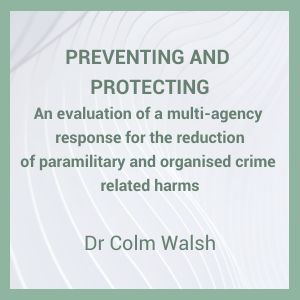Preventing and protecting: An evaluation of a multi-agency response for the reduction of paramilitary and organised crime related harms
Dr Colm Walsh

In the decades that have followed the Good Friday Agreement, armed groups have remained part of the fabric of some communities in Northern Ireland. Despite an assimilation into civic society by some of the members of those armed groups, others have not yet ceded their influence.
As part of the societal wide effort to understand and respond to paramilitary related harms through the Tackling Paramilitarism and Organised Crime Programme, Belfast City Council (BCC) has chaired a multi-agency support panel. Extending beyond the confines of West Belfast during the pilot phase, the panel now supports those at risk of paramilitary related harm in North Belfast.
A mixed methods evaluation was undertaken to review progress towards reducing incidences and impact of such harms and explore the experiences of those engaged on the panel.
To download this report, please click on the link below.
